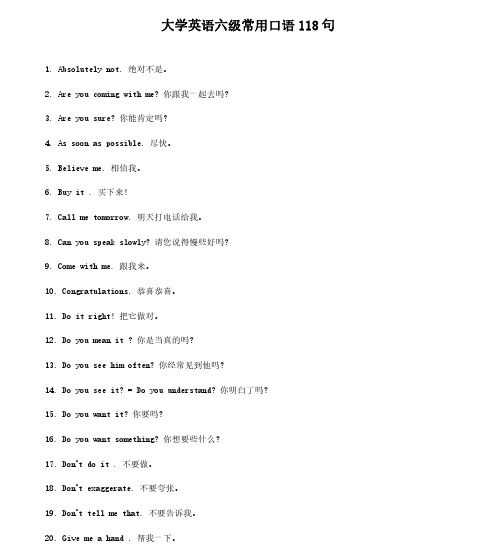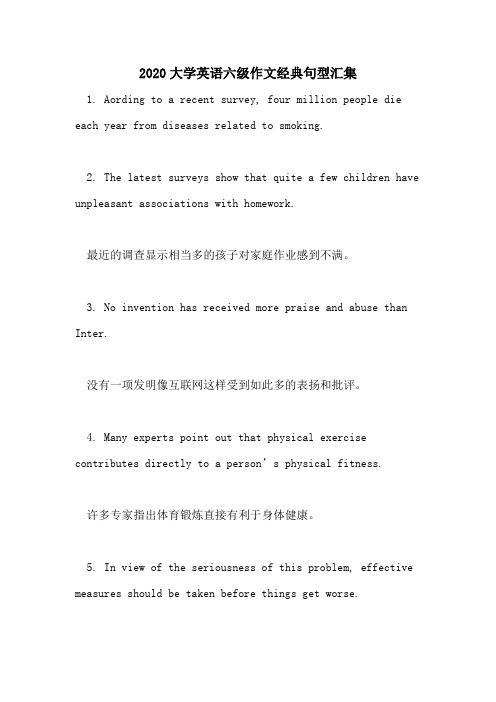2020年下半年英语六级口语常用句型精选汇编(最新)
大学英语六级常用口语118句

大学英语六级常用口语118句1.Absolutely not.绝对不是。
2.Are you coming with me?你跟我一起去吗?3.Are you sure?你能肯定吗?4.As soon as possible.尽快。
5.Believe me.相信我。
6.Buy it.买下来!7.Call me tomorrow.明天打电话给我。
8.Can you speak slowly?请您说得慢些好吗?e with me.跟我来。
10.Congratulations.恭喜恭喜。
11.Do it right!把它做对。
12.Do you mean it?你是当真的吗?13.Do you see him often?你经常见到他吗?14.Do you see it?=Do you understand?你明白了吗?15.Do you want it?你要吗?16.Do you want something?你想要些什么?17.Don‟t do it.不要做。
18.Don‟t exaggerate.不要夸张。
19.Don‟t tell me that.不要告诉我。
20.Give me a hand.帮我一下。
21.Go right ahead.一直往前走。
22.Have a good trip.祝旅途愉快。
23.Have a nice day.祝你一天过得愉快。
24.Have you finished?你做完了吗?25.He doesn‟t have time.他没空。
26.He is on his way.他现在已经在路上了。
27.How are you doing?你好吗?28.How long are you staying?你要呆多久?29.I am crazy about her.我对她着迷了。
30.I am wasting my time.我在浪费时间。
31.I can do it.我能做。
六级口语模板万能句型

六级口语模板万能句型作为英语学习的一个重要部分,口语是检验学习成果的重要手段之一。
然而每个人的口语能力都有差异,一些人面对口语考试会比较紧张而发挥不好。
今天,本文将会为大家介绍一些六级口语模板和万能句型,帮助大家更好地备考口语考试。
一、开头万能句型在口语考试的开头,我们需要有一个好的引子来引入我们想要表达的内容。
以下是一些典型的开头万能句型:1. Hello everyone, my name is XX, and I am really glad to be here today.2. Good morning/afternoon/evening, ladies and gentlemen. Thank you for giving me this opportunity to speak here today.3. As an old saying goes, “XXXXXXXXXX” (引用一则名言). Based on this concept, today I’d like to talk about XXXXX.这些开头的句型虽然简单,但是足以引起考官的注意,让人们对你的演讲感到自然舒适。
二、论述万能句型在论述的过程中,我们最好能够使用一些万能句型来增加口语的准确性和说服力。
1. To begin with, let's take a look at the first argument for/against...2. Another reason why I believe...3. Furthermore, it has been proven that...4. As a matter of fact, research has shown that...这些句型很好地展示了我们的逻辑思维和语言功力,让我们的表述更加充实和有说服力。
三、结论万能句型一个漂亮的结论可以让我们印象深刻,把我们的观点明确地传递给考官。
2020大学英语六级作文经典句型汇集

2020大学英语六级作文经典句型汇集1. Aording to a recent survey, four million people die each year from diseases related to smoking.2. The latest surveys show that quite a few children have unpleasant associations with homework.最近的调查显示相当多的孩子对家庭作业感到不满。
3. No invention has received more praise and abuse than Inter.没有一项发明像互联网这样受到如此多的表扬和批评。
4. Many experts point out that physical exercise contributes directly to a person’s physical fitness.许多专家指出体育锻炼直接有利于身体健康。
5. In view of the seriousness of this problem, effective measures should be taken before things get worse.考虑到问题的严重性,在事态进一步恶化之前必须采取有效的措施。
6. Proper measures must be taken to limit the number of foreign tourists and great efforts should be made to protect local environment from the harmful effects of international tourism.应该采取适当的措施限制外国旅游者的数量,努力保护当地环境不受国际旅游业的不利影响。
7. Many city residents plain that there are so few buses in their city that they have to spend much more time waiting for a bus, which is usually crowded with a large number of passengers.许多市民抱怨城市的公交车太少,以至于他们花很长时间等来的却是一辆已经载满乘客的公交车。
英语六级口语考试必备40句

英语六级口语考试必备40句英语六级口语考试必备40句1、I see.我明白了。
2、I quit! 我不干了!3、It's commendable.值得赞扬。
4、It's exactly what I wanted.这正是我想要的。
5、I'm honored to meet you.很荣幸见到你。
6、Not in the long term.从长远来说不是这样的。
7、It's a pleasure to do that for you.很高兴能为你做这件事。
8、I'm very pleased with your work.我对你的工作非常满意。
9、Please tell me something about your scholarship in Harvard University.请告诉我一些你在哈佛大学获得奖学金的情况。
10、It's really smooth/真好喝。
11、I'm crazy about her/him.我疯狂喜欢她/他。
12、You can always count on him/her.你总能信任他/她。
13、She/He is a real go-getter.她/他是个拼命干的人。
14、She/He knows the answers to all the questions.她/他知道所有问题的答案。
15、I've got a hang of it now.现在我完全明白了。
16、I've just got the message that the plane will be late.我刚得到消息说飞机晚点了。
17、We've got to hit the road.我们得出发了。
18、We've got a lot of work to do.我们有很多工作要做。
19、I almost hit the wall today.我今天快累垮了。
2020最新年6月大学英语六级听力口语关键句

【篇一】2020年6月大学英语六级听力口语关键句This means that any thought about a certain subject will often bring up more memories that are related to it.点睛certain此处意为“某个,某种”。
bring up在句中意为“引起,勾起”。
that引导的是memories的定语从句,其中be related to意为“与……相关”。
考点归纳短语bring up还有如下常见含义:“抚养,养育,教养”。
如:He was brought up by his grandparents. 他是由祖父母抚养长大的。
“提出(讨论等)”。
如:I hate to bring up the subject of money. 我讨厌提钱这个话题。
“呕吐”。
如:She can't eat anything without bring it up. 她吃什么都会吐。
“调出,使显示在计算机屏幕上”。
如:Click that button to bring up a new menu. 点击那个按钮,调出一个新菜单。
【篇二】2020年6月大学英语六级听力口语关键句They fail to account for individual differences, and the wide range of characteristics among members of any group.点睛fail此处意为“未能,未做”,属于形式上肯定,但含义上否定的情况。
account for此处意为“对……作出解释或说明”,还含有“对……负有责任”的意思。
characteristic意为“特征,品质”。
考点归纳其他肯定形式表达否定含义的短语还有:the last+名词+to不定式/从句,意为“最不……”。
如:That's the last thing I would like to do. 那是我最不愿意做的事。
2020年六级英语常用句型,单词,短语

2020年12月英语六级作文常用句型【篇一】精选2020年12月英语六级作文常用句型主体to begin with, then, furthermore, finally(强烈推荐)to start with, next, in addition, finally(强烈推荐)first and foremost, besides, last but not least(强烈推荐)most important of all, moreover, finallyon the one hand, on the other hand(适用于两点的情况)for one thing, for another thing(适用于两点的情况)in comparison, likewise, similarly, in the same manneron the other hand, conversely, whereas, while, instead, nevertheless, in contrast, on the contrary, compare d with …【篇二】精选2020年12月英语六级作文常用句型结尾Obviously(此为过渡短语), we can draw the conclusion that good manners arise from politeness and respect for others.to sum up, in conclusion, in brief, on account of this, thus Thus, it can be concluded that…, Therefore, we can find that…Obviously, it is high time that we took some measures to solve the problem. Accordingly, I recommend that some measures be taken.【篇三】精选2020年12月英语六级作文常用句型谚语1.Practice makes perfect.熟能生巧。
2020年大学英语六级口语必备:口语化短语(1)

2020年大学英语六级口语必备:口语化短语(1) whats your asl? 你的,年龄,性别,地点? (聊天用的) how are you doing (or: how you doiin) 你好。
whats up 什么事? 或是:你好lol 大笑 = laugh out loudso long 一般不用它。
意思是:再见what are you into?(what you into) 你对什么感兴趣?Im into you. 我喜欢你Im into.... 我喜欢。
对。
感兴趣wanna want to 和 wanted to 的省写gonna going to 的省写。
不是 went to 的啊!prick , dick , cock 骂人的。
意思是,几吧suck 恶心hip hop , rock, rap,pop, 说唱,摇滚,说唱,流行歌bah bye 再见what are you up to( ) 最近怎么样butt, ass 屁股shut up . shut the hell up , shut the fuck up. 闭嘴cuss , abuse 骂人cut the crap 别废话bullshit. 胡说sit back 别管闲事儿feel shit about oneself 感觉不爽cool 酷be good 听话sorry ass 可怜的人,,,贬义词kick 踢shitty day 倒霉的一天。
oh yeah? 表示怀疑。
是么?pic 照片give it a shot. give it a go. 试一是try me. 你试试。
(A:I’ll kill you B: try me) A:我杀了你。
B:你试试.be quiet 安静what the fuck ,what the hell , what the hack, (wtf ) 真他XX的!hobby 爱好cute 可爱(美国人不长说“帅(handsome)" 用CUTE代替能够说a handsome car.what do you look like (what you look like)你长什么样how tall are you(how tall are ya)你多高so what 那又怎样??那又如何??cutie 可爱的人pretty 漂亮,(指人和物) pretty girl. pretty flowers faggot 笨蛋retard 听起来象烟鬼的人suck 恶心(动词)you suck! 你恶心!。
六级口语句式

六级口语句式六级口语句式在六级口语考试中,使用恰当的句式可以帮助我们表达思想,提供更加准确和流利的回答。
以下是一些常用的六级口语句式:1. 提出观点句式:- In my opinion/view,…- From my perspective,…- I believe that…- It seems to me that…- Personally, I think…这些句式可以用于表达个人观点和意见,并在回答问题时加强语气。
例句:In my opinion, traveling is the best way to broaden our horizons.2. 解释原因句式:- The reason why…- One possible reason is that…- This can be attributed to the fact that…- There are several factors contributing to this…使用这些句式可以帮助我们解释原因和提供支持性的论据。
例句:The reason why people prefer online shopping is that it offers a wider range of choices and is more convenient.3. 对比观点句式:- On the one hand, … On the other hand,…- However, …- Nevertheless, …- Despite the fact that…- Although it is true that…, it is also true that…这些句式可以用于对比不同的观点或提供相反的论据。
例句:Although social media allows us to connect with others easily, it also leads to a lack of face-to-face interaction.4. 举例子句式:- For example,…- Take… for instance.- A typical example is…- This can be illustrated by…通过举例子,我们可以更好地说明观点,使回答更具体和有说服力。
- 1、下载文档前请自行甄别文档内容的完整性,平台不提供额外的编辑、内容补充、找答案等附加服务。
- 2、"仅部分预览"的文档,不可在线预览部分如存在完整性等问题,可反馈申请退款(可完整预览的文档不适用该条件!)。
- 3、如文档侵犯您的权益,请联系客服反馈,我们会尽快为您处理(人工客服工作时间:9:00-18:30)。
没有被折磨的觉悟,就没有向前冲的资格。
既然选择了,就算要跪着也要走下去。
其实有时候我们还没做就被我们自己吓退了,想要往前走,就不要考虑太多,去做就行了。
以下为“2020年下半年英语六级口语常用句型3篇”,欢迎阅读参考!更多相关讯息请关注!【篇一】2020年下半年英语六级口语常用句型你不舒服吗?Are you feeling okay? *见到身体状况不好的人时的问话。
Do you feel all right?你怎么了?What's wrong? *wro ng “身体不舒服”。
What's wrong? (你怎么了?)I'm not feeling well. (我觉得身体有点不对劲。
)Is anything wrong?Are you okay?What's the matter? *matter“问题”、“麻烦”。
Is everything all right?你的脸色真不好。
You look pale. *pale“脸色不好的,没有血色的。
”You look pale. Are you okay? (你的脸色很难看。
没事吧?)I guess I'm just tired. (我想可能是有点儿累了。
)You don't look well. (你看上去身体不太好。
)我觉得难受。
I don't feel well.I don't feel well. (我觉得难受。
)Please sit down for a while. (你坐会儿吧。
)I'm not feeling well.你好像不太舒服。
You don't look well. *look“看上去……”。
You don't look well. (你好像不太舒服。
)I have a cold. (我感冒了。
)她昏过去了。
She passed out. *pass out“昏过去,失去知觉”。
我觉得难受。
I feel sick.I don't feel well.I feel bad.我肚子疼。
I have a stomachache. *stomachache“胃痛,腹痛”。
I have a stomachache. (我肚子疼。
)How long have you had it? (疼多长时间了?)I have a stomachache. (我肚子疼。
)Did you eat too much? (是不是吃多了?)My stomach hurts.隐隐作痛。
I have a dull pain.钻心地疼。
I have a sharp pain.一跳一跳地疼。
I have a throbbing pain. *throb“一跳一跳地”、“突突地跳”。
我感到巨痛。
I have a piercing pain. *pierce“(痛苦等)刺骨,刻骨”。
像针扎似地疼。
I have a stabbing pain. *stab“刺”、“针扎”。
我拉肚子了。
I have diarrhea. *diarrhea“拉肚子”。
我食物中毒了。
I have food poisoning.血压高/低。
I have high/low bloo d pressure. *blood pressure“血压”。
我头疼。
I have a headache.What happened, sir? (你怎么了?)I have a headache. (我头疼。
)My head hurts.My head is pounding.I have a splitting headache. (我的头像裂了似地疼。
)【篇二】2020年下半年英语六级口语常用句型再见!Goodbye. *分手时最常用的寒暄用语。
Goodbye. (再见!)Goodbye. Take care! (再见,保重啊!)再见!Bye. *比Goodbye的说法随便。
Bye for now.Have a nice day. (祝你今天愉快!)See you later. (以后见!)回头见!See you.See you later.See you soon.See you again.Catch you later.See you around. *用于在同一座楼里,过会儿还有可能再见面时。
我去了啊。
I'm off now. *off “去,走开”。
I'm leaving.See you.我得告辞了。
I have to go.I have to go. (我得告辞了。
)Can't you stay a little longer? (再呆会儿吧!)祝你好运!Good luck! *在对某人去旅行或去做一件比较难的事情时使用。
Good luck! (祝你好运!)Thanks. I need it. (谢谢,借你吉言。
)I wish you good luck.祝你愉快!Have a nice day. *与Goodbye的用法一样。
Have a nice day! (祝你愉快!)Same to you. (也祝你愉快!)祝你周末愉快!Have a nice weekend.加油啊!祝你好运!Good luck.Break a leg. *原本是对要上台演出的人说的话。
Go for it. (走吧!)Hang in there. (那,加油吧!)祝你玩得愉快。
Have fun.We're going to Hawaii! (我们要去夏威夷喽!)Have fun! (祝你玩得愉快。
)Have a good time!就这样,坚持下去。
Keep it up.Keep it up! (就这样,坚持下去。
)Thanks for the encouragement. (谢谢你的鼓励!)别干得太猛。
Don't work too hard.Take care.Be careful.旅途愉快!Have a nice trip. *对要去旅行的人说的话。
【篇三】2020年下半年英语六级口语常用句型嗨!你好!Hi! *比Hello随便,用于比较熟悉的人,男女都可以用。
Hi! (嗨!)Hi! (嗨!你好!)你好!Hello. *一天中常用的寒暄用语。
A)Hello, Mr. Smith. (史密斯先生,您好!)B)Oh, hi John. (嗨,约翰,你好!)*A为学生,B为老师。
你好!Good afternoon. *下午用寒暄用语。
主要用于工作环境中。
晚上好!Good evening.你好吗?How are you? *最常用的问候方式。
除了有问候对方“你好吗”的意思外,还含有“午安”在内的意思。
Hi, John! (嗨!约翰,你好!)Oh, Mary! How are you? (噢,玛丽,你好吗?)How are you? (你好吗?)Pretty good. (非常好。
)How's it going?How're you doing? *语气较随便。
我很好,谢谢。
Fine, thank you.I'm fine, thank you.不怎么好。
Not so good. *用于身体状况不好或是有其他什么不好的事时。
How are you feeling? (你的身体怎么样?)Not so good. (不怎么好。
)Not so great.Could be better. *虽然“有向好的方向发展的余地”,但给人一种“不怎么好”的语感。
老样子。
Nothing much.Nothing special.认识您我很高兴。
Glad to meet you. *用于初次见面。
I'm glad to meet you.Nice to meet you.It's great meeting you.出什么事啦?What's up?What's up? (出什么事啦?)Nothing much. (没什么。
)What's new? *用于强调有无新的变化。
What's happening? *强调“发生什么事情了?”How've you been? *有好长时间没见的语感。
你的家人怎么样?How's your family?How's your family? (你的家人怎么样?)Everyone's fine. (大家都很好。
)还好吧?How's everything? *意为“进行得顺利吗?”。
如果在饭馆服务员这样问的话是“饭菜怎么样?”的意思。
How's everything? (怎么样,还好吧?)It's going pretty well. (一切很顺利。
)How's everything? (还好吧?)Same as always. (和平常一样。
)How's everything going?How's it going?How are things?工作怎么样?How's business?还可以。
Not bad.今天怎么样?How did it go today? *用于会议或聚会等特别场合。
How did it go today? (今天怎么样?)So-so. (还凑合吧。
)How was your day?和往常一样。
Oh, same as usual.How was work today? (今天工作怎么样?)Oh, same as usual. (和往常一样。
)Same old, same old. *俚语。
Another day, another dollar.急着干什么去呀?What's the hurry?。
